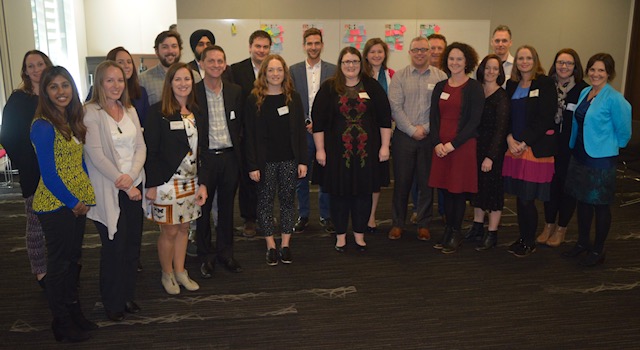Putting the Global Goals into action: 23 leaders and 21 recommendations

SOURCE: Kate Alcock, Climate & Resources Manager
This year’s SBC Future Leaders’ Programme was focused on developing leadership for action on the UN’s Sustainable Development Goals (SDGs).
The programme was a huge success. SBC was blown away by the huge amount of work and thinking 23 programme participants did on this hugely complex topic. The creativity and passion in their recommendations was fantastic, and SBC looks forward to picking-up on many of their ideas and taking them forward with many of its member companies.
SBC and Catapult have held three workshops over the last four months, dividing the participants into five separate groups to research and develop recommendations for action on five SDGs, using adaptive leadership frameworks.
The groups presented their findings to an audience last week, including their sponsors, who were senior executives from within their own companies.
SDG7’s goal is affordable and clean energy for all. The group presented a comprehensive seven- point strategic plan to advance the goal in New Zealand, outlining the roles of all sectors. It included the development of a ‘transition plan’, supporting businesses with vision, targets and uptake of clean energy actions; and SBC members influencing common suppliers in the value chains to do the same.
SDG9 covers a large scope, aiming tobuild resilient infrastructure, promote inclusive and sustainable industrialisation and foster innovation. The group acknowledged that there are a lot of good tools and frameworks already in existence. Action could be mobilised by bringing together multiple stakeholders for diverse thinking to solve an issue such as a specific project alliance or internal corporate innovation centre. SBC could support this by creating a repository of organisations whose capability can be tapped into.
The SDG11 Sustainable cities and communities group proposed that young people must be supported to adopt their role as change agents for the future. It is essential to facilitate the public and private sectors and young people to provide tools and ongoing support for young leaders to mobilise others and achieve scale on the SDGs. The model will place 50 young leaders in businesses, and equip them as change agents, future leaders and influencers.
SDG12 aims for responsible consumption and production. It also has a broad scope – with a focus including decreasing fossil fuels and general & food waste, increasing sustainable business practices and reporting; and educating consumers about responsible consumption. The groups four recommendations aim to highlight opportunities for collaboration on these topics, through building awareness, SBC facilitated workshops and strengthening reporting requirements and transparency.
SDG13’s Climate Action group researched the different levers and mechanisms to quickly shift the system on climate change action in New Zealand. They identified the main barrier to getting business son board was a lack of a compelling vision of the future and a positive narrative on what business stands to gain. Their presentation was an awards ceremony in 2030 presented to NZ business for implementing ambitious net zero strategies, along with some of the supporting frameworks.
The programme participants and sponsors discussed the importance of collaboration platforms to deliver their desired outcomes, and how their businesses are adopting more agile ways of thinking and working.
SBC will now work with all of the groups to develop key recommendations, and share these with members at the (How to) Push Go on the Global Goals event in November.
Finally, the full group shared their own behaviours, thoughts and actions for being resilient. We discussed whether we’re players on the field; or spectators in the stands, and how we have the opportunity to be a leader in every action that we take.
He aha te kai ō te rangatira? He Kōrero, he kōrero, he kōrero.
What is the food of the leader? It is knowledge. It is communication.
Kate Alcock, Climate & Resources Manager
Contact: Kate Alcock, Climate & Resources Manager
Phone:
Email:
